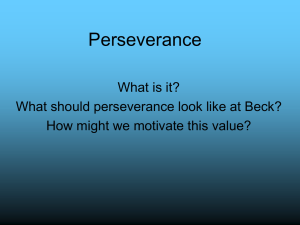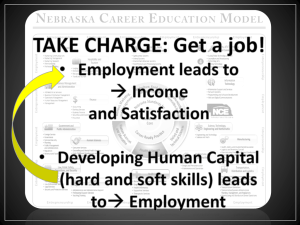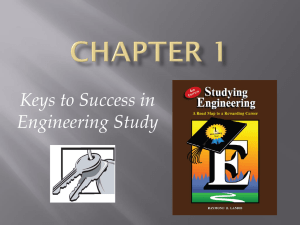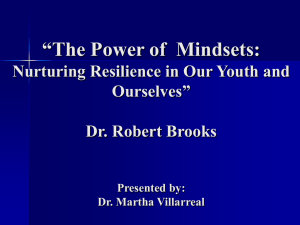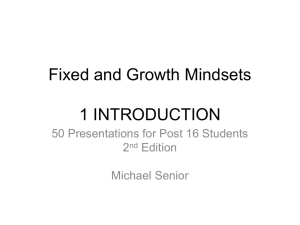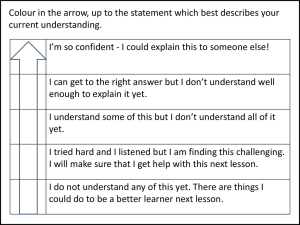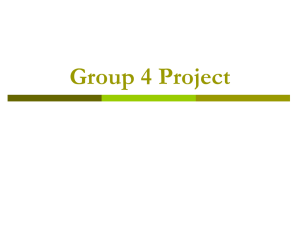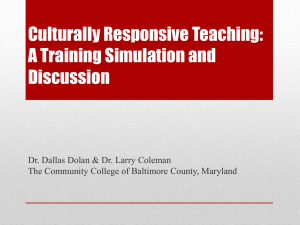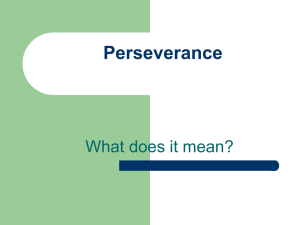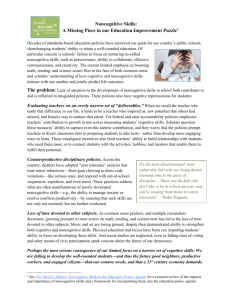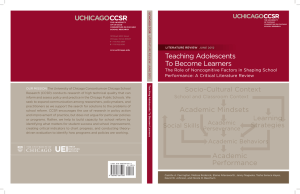Noncognitive Factors - Washington School Counselor Association
advertisement
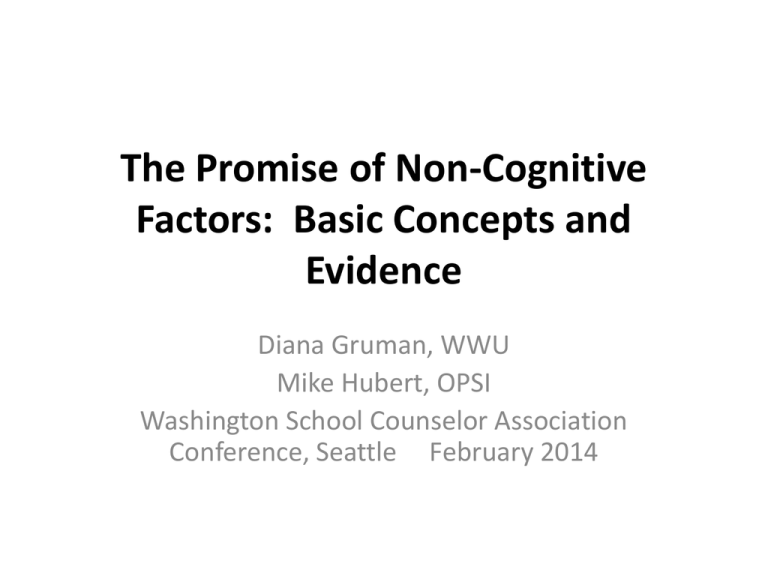
The Promise of Non-Cognitive Factors: Basic Concepts and Evidence Diana Gruman, WWU Mike Hubert, OPSI Washington School Counselor Association Conference, Seattle February 2014 Objectives for Today • Provide an overview of the latest research on noncognitive skills • Define key concepts • Connect the findings on noncognitive skills to school counseling practice • Provide a sample of our favorite resources to learn more about the topic and potential interventions Sources of Inspiration & Knowledge We would like to acknowledge the following sources as the foundation of this presentation: 1. CCSR Literature Review (2012): “Teaching Adolescents to Become Learners.” 2. DOE-Office of Ed. Tech . Report (2013): “Promoting Grit, Tenacity and Perservance.” 3. Carol Dweck (2007): “Mindset.” 4. Paul Tough (2012): “How Children Succeed.” Making the Case Posted: May 2013 http://new.ted.com/talks/angela_lee_duckworth_the_key_to_success_grit Cognitive Factors Cognitive: “Relating to, or involving conscious mental activities (such as thinking, understanding, learning, and remembering).” (Merriam-Webster: m-w.com) – Some ways we measure cognitive skills: • Grasp of Content Knowledge • Writing Skills • Problem Solving Ability Noncognitive Factors Noncognitive: Attributes, dispositions, social skills, attitudes, and intrapersonal resources, independent of intellectual ability—that highachieving individuals draw upon to accomplish success. (OET Report, 2013) TURN AND TALK: What are the factors you are hearing and reading about?? What’s in a Name? • • • • • • • • • • • Habits of Mind (Dewey, 1880-1940) Natural Development (Montessori, 1910-50) Internal Locus of Control (Rotter, 1954) Self efficacy (Bandura, 1986) Student Agency Learner Attributes Social-Emotional Learning 21st Century Skills or Soft Skills Character Education Emotional Intelligence Teaching the Whole Child Five Categories of Noncognitive Factors: • • • • • Academic Behaviors Academic Perseverance Academic Mindsets Learning Strategies Social Skills https://ccsr.uchicago.edu/publications Academic Performance (Course Grades) Socio-Cultural Context School & Classroom Context Academic Mindsets Social Skills Academic Perseverance Academic Behaviors Academic Performance Learning Strategies Can these skills be taught? Learned? Research shows that some noncognitive factors can be shaped in all children: • Academic Mindset- I can grow my ability and competence with effort • Effortful Control—I can push through the “boring” stuff • Strategies and Tactics—I can define my tasks, monitor progress and change course if needed #1 Academic Behaviors • Behaviors associated with being a “good student” – Regular attendance – Ready to engage the work – Participating in class discussions – Completing assignments Connection to SC Practice • Talk, Turn and Share • What ways do school counselors play a role in improving the academic behaviors in students? • Which ones of these methods are evidencebased? #2 Learning Strategies • The processes and tactics employed to aid in learning such as: – Study skills – Metacognitive strategies ( monitoring one’s own comprehension) – Self-regulated learning ( ability to self correct) – Goal setting & time management Connection to SC Practice • Talk, Turn and Share • What ways do school counselors play a role in improving the learning strategies in students? • Which ones of these methods are evidencebased? #3 Academic Mindsets • Beliefs, attitudes, or ways of perceiving oneself in relation to learning – I belong in this academic community – My ability and competency grow with my effort – I can succeed at this – This work has value for me Growth Mindset When faced with failure or challenge, people with a GROWTH mindset: • Pay attention to learning information, and so do better on future tests. • Focus on what they are learning, rather than focusing on how they feel. • Try out new ways of doing things. • Use self-motivating statements such as ‘The harder it gets, the harder I try’. • When faced with tests which are impossible to pass, they consider other factors rather than blaming their intellect (e.g. “This test was beyond my ability for now. Growth-mindset thinking results in: •a love for learning and self-improvement •a desire to be challenged •a willingness to work for positive results •a belief that you can control the outcomes in your life with effort and practice •the ability to learn from mistakes and failures •emotional resilience Fixed Mindset When faced with failure or challenge, people with a FIXED mindset: • • • • Do not pay attention to learning information Get depressed, lose self-esteem Say to themselves ‘I am not smart.’ Under-represent past successes and overrepresent failures (I NEVER do things right) • Explain the cause of events as something stable about them. (I am ALWAYS this way!) Fixed-mindset thinking results in: • a false sense of superiority, undermined by a deep sense of self-doubt • a fear of failure; refusal to take risks • a feeling that failure permanently defines you as a loser • the belief that only untalented, ungifted people have to work for success; effort somehow reduces you • a desire to blame others or outside circumstances when things don’t go your way Academic Mindsets Evidence • Sense of belonging – Learning is a social activity, constructed through interaction • Belief of ability – Those that increase effort, display perseverance and succeed • Self-efficacy – We engage in activities in which we feel confident • Value – When activity is connected to our preferred future, we are more likely to pursue it Connection to SC Practice • Talk, Turn and Share • What ways do school counselors play a role in improving the growth mindsets in students? • Which ones of these methods are evidencebased? #4 Social Skills • Interpersonal qualities such as: – Cooperation – Assertion – Responsibility – Empathy Noncognitive Learning Skills Background: And are They Important? Teacher Beliefs about SEL Positive Student Outcomes 90 85 80 75 70 65 60 55 50 Workforce Readiness School Attendance & Graduation Life Success College Preparation Academic Success Positive Student Outcomes The Missing Piece: A National Teacher Survey on How Social and Emotional Learning Can Empower Children and Transform Schools - http://www.casel.org/library/the-missing-piece Connection to SC Practice • Talk, Turn and Share • What ways do school counselors play a role in improving the social skills of students? • Which ones of these methods are evidencebased? #5 Academic Perseverance • A student’s ability to remain focused and engaged in school work despite distractions, setbacks, or obstacles – Grit – Self-control – Tenacity – Delayed Gratification Grit and Perseverance Factors essential to an individual’s capacity to strive for and succeed at long-term and higher-order goals, and to persist in the face of the array of challenges and obstacles encountered throughout schooling and life (OET Report, 2013) Academic Perseverance Evidence • Perseverance is a trait that is not directly malleable. • The evidence can be found in academic mindsets that encourage perseverance and the adoption of learning strategies What type of learning environment promotes grit and perseverance? 1) Opportunities to take on appropriate challenges (in the child’s Zone of Prox. Devpt) 2) Rigorous and Supportive Environment: – Fair and respectful climate, conveys high expectations, – Emphasizes effort over ability, and provides necessary tangible resources—materials, human, and time. Connection to SC Practice • Talk, Turn and Share • What ways do school counselors play a role in improving the perseverance of students? • Which ones of these methods are evidencebased? Teaching the Whole Child • • • • • • • • • • Student-Centered Discipline Teacher Language Responsibility & Choice Warmth & Support Cooperative Learning Classroom Discussions Self-Reflection & Self- Assessment Balanced Instruction Academic Press and Expectations Competency Building – Modeling, Practicing, Feedback, & Coaching Center on Great Teaching and Learning at AIR January 2014 “Teaching the Whole Child: Instructional Practices That Support Social-Emotional Learning in Three Teacher Evaluation Frameworks.” http://www.gtlcenter.org/ Barriers and Potential Solutions Adverse Childhood Experiences • http://acestudy.org/ • http://acestoohigh.com/ Trauma Informed Schools • http://acestoohigh.com/2013/08/20/spokanesch ools/ Restorative Justice and School Discipline • https://aclu-wa.org/blog/restorative-disciplinepays-suspensions-down-grades-behaviorimproved RESOURCES BOOKS How Children Succeed, Paul Tough (2012) Mindset, Carol Dweck (2007) WEBSITES -CASEL: http://www.casel.org/ -Chicago/CCSR: csr.uchicago.edu/ -Center for Great Teaching at AIR http://www.gtlcenter.org/ Growth Mindset Resources Mary Cay Ricci (2013), “Mindsets in the Classroom.” http://www.mindsetworks.com/free-resources/ http://classteaching.wordpress.com/2013/04/07 /developing-a-growth-mindset/ http://ams.auburnschl.edu/pages/AuburnMS/C ORE/Additional_CORE_Activities/Mindset_Act ivities "The function of education is to teach one to think intensively and to think critically... Intelligence plus character - that is the goal of true education." - Martin Luther King, Jr.
